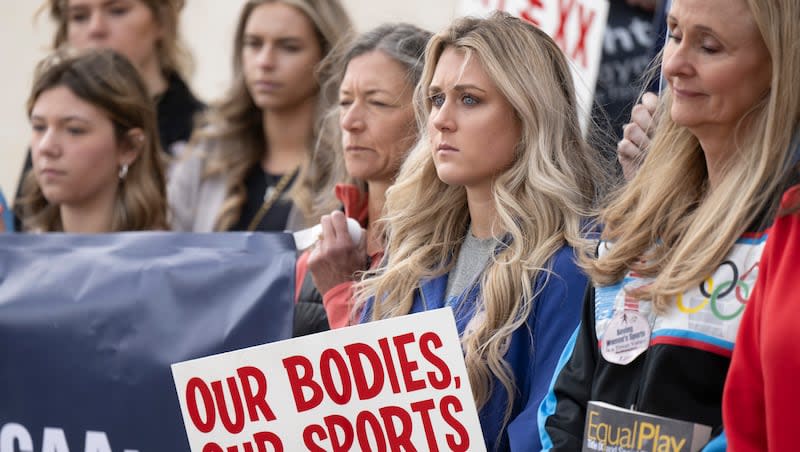Female athletes sue NCAA over transgender policy

- Oops!Something went wrong.Please try again later.
- Oops!Something went wrong.Please try again later.
A group of 12 female athletes, including Riley Gaines, a former University of Kentucky competitive swimmer, has sued the National Collegiate Athletics Association over its policy toward transgender athletes.
The lawsuit, first reported by The Free Press, claims the NCAA violated Title IX by allowing transgender athlete Lia Thomas to compete in the 2022 swimming championship, arguing that female competitors don’t have “equality and equal opportunity” in sports competitions.
The lawsuit seeks to force the NCAA to change its rules, disallowing biologically male athletes to compete in women’s sports.
It also asks that the NCAA revoke the awards given to trans athletes, and instead recognize the female competitors, in addition to seeking “damages for pain and suffering, mental and emotional distress, suffering and anxiety, expense costs and other damages due to defendants’ wrongful conduct.”
Thomas, who competed for the University of Pennsylvania, won the NCAA Division I title, becoming the first trans woman athlete to do so. Thomas also tied for fifth place with Gaines in the 200-yard final for which Thomas received a trophy but Gaines didn’t. Thomas competed for the men’s team from 2017 to 2020 but never qualified for the NCAA championship as part of that team.
According to The Associated Press, the NCAA issued a statement, saying, “College sports are the premier stage for women’s sports in America, and while the NCAA does not comment on pending litigation, the Association and its members will continue to promote Title IX, make unprecedented investments in women’s sports and ensure fair competition in all NCAA championships.”
The NCAA is in the process of revising its policy by incorporating national and international governing body standards, as per ESPN. This includes requesting trans-student-athletes to provide documentation related to testosterone levels.
The athletes are also suing the University System of Georgia, where the championship took place in 2022. They did not issue a comment.
The lawsuit also claims the NCAA violated the Equal Protection Clause of the Fourteenth Amendment. Kylee Alons, another plaintiff who participated in the NCAA championship, told The Free Press she felt uncomfortable sharing the women’s locker room with Thomas.
“I was literally racing U.S. and Olympic gold medalists and I was changing in a storage closet at this elite-level meet,” Alons said. “I just felt that my privacy and safety were being violated in the locker room.”
Marshi Smith, co-founder of the Independent Council On Women’s Sports, which funded the lawsuit, told Forbes in a statement that it “isn’t just about competition; it’s a fight for the very essence of women’s sports.”
“We’re standing up for justice and the rights of female athletes to compete on a level playing field,” Smith added.
After the 2022 NCAA competition, Thomas became the face of the national conversation on the participation of transgender athletes in sports. Opponents argue trans athletes have an unfair advantage. At least 24 states, including Utah, Idaho, and Texas, have imposed a ban on transgender students from participating in sports that don’t align with their gender at birth.
“Trans women are not a threat to women’s sports,” Thomas said on “Good Morning America” following the NCAA championship.
Earlier in January, Thomas sued World Aquatics for banning most trans women from competing at the highest level in the sport, a decision issued in June 2022, as NBC News reported at the time. This rule allowed those individuals who transitioned before 12 years of age to compete. It’s worth noting that in 2023, World Aquatics established an open category for transgender athletes during a World Cup in Berlin.

